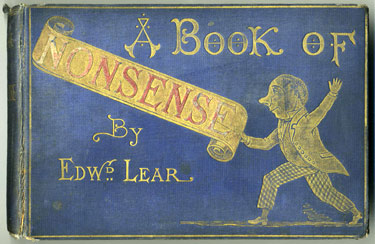There Once Was a Verse Form Called Limerick
 At World Wide Words this week, Michael Quinion puzzled over the term “limerick.” That type of poem started to appear in print in the 1820s, but it took decades before the label came along.
At World Wide Words this week, Michael Quinion puzzled over the term “limerick.” That type of poem started to appear in print in the 1820s, but it took decades before the label came along.
Among the earliest examples is this, from the picture book Anecdotes and Adventures of Fifteen Young Ladies:
There was a young lady named Ryder,Edward Lear adopted the five-line form for his little-noted-at-the-time Book of Nonsense (1846).
She shrunk at the sight of a spider;
She once gave a scream,
And leaped into the stream,
When she saw one crawling beside her.
Several Gaelic examples appeared in James Clarence Mangan and John O’Daly’s The Poets and Poems of Munster (1850), tagged to a melody called “The Growling Old Woman.” In his 1904 Pulse of the Bards, after the limerick was a recognized form, P. J. McCall translated “The Growling Old Woman” from the Gaelic like so:
Woman of the House—(The emphasis on tobacco suggests the Gaelic verse doesn’t go back earlier than the 1600s.)
I’ve no one to help with the churnin’,
Or bake a slim cake without burnin’,
Or get a bit ready for Nickeen an’ Neddy,
When hay in the meadow they’re turnin’;
That pig never stops with his squallin’;
The boneens go rootin’ an’ bawlin’;
The ducks an’ the hens lay away in the glens,
An' the roof of the cowhouse is fallin’.
The Household—
O, you growlin’ old woman!—
Be aisy—the neighbours are comin’!
Tobacco full ripe we will put in your pipe
To make your heart happy an’ human!
Woman of the House—
Our cow gives her milk to the fairies;
Our calf’s not as handsome as Mary’s;
My bonnet an’ bo are a shame an’ a show,
An’ my gown in the clauber conthraries!
My man takes his time fair an’ aisy;
The boys are light-headed an’ lazy,
The girls ever singin’, when washin’ or wringin’—
Enough to drive anyone crazy!
The Household—
Whisht! you growlin’ old woman!
Be aisy—the neighbours are comin’,
Tobacco full ripe we’ll put in your pipe
To make your heart happy an’ human!
A Neighbour—
Ould woman, I’m thinkin’ you’re jokin’!
You lie by the fire always pokin’,
An’, if any use, you give tons of abuse—
An’ the Ould Boy can’t bate you at smokin’!
Your man works the hardest in Erin;
Your boys are both brave an’ unfearin’;
Your girls are the sweetest, the quickest an’ neatest;
’Tis you are the pig by the mearin’!
The Neighbours—
Whisht, you growlin’ old woman!
Your conduct is most unbecomin’,
Tobacco full ripe—twice the full o’ your pipe,
Wouldn’t make your heart happy an’ human!
Early last year scholar Stephen Goranson found a limerick published in the St. John [New Brunswick] Daily News in 1880 with the label: “Tune, wont you come to Limerick.” That’s seems to be the earliest link of the Irish city of Limerick, in the province of Munster, to the poetic form. But it comes with a musical mystery: that tune is a jig, and it’s hard to sing limericks to it. Goranson also documented many examples of “come to Limerick” to mean to surrender or settle differences, which may be totally unrelated.
There are also appearances of the phrase “Limerick rhyme” as early as 1880, without examples to show exactly what the writers meant. By the mid-1890s, however, a “limerick” was clearly the form we expect today.


No comments:
Post a Comment